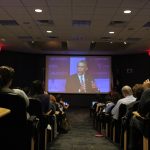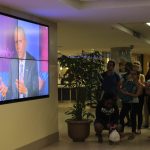Photo by Megan Tait/The Beacon
Adrian Suarez Avila/ News Director
The University boasted an executive presence on Wednesday, Feb. 25.
“It is wonderful to be with the Golden Panthers,” said President of the United States Barack Obama during his visit to the University for his discussion on immigration reform.
Hosted by news anchor Jose Diaz-Balart, the event was organized by MSNBC and Telemundo.
“We’ve had a system for a very long time that nobody’s happy with,” said Obama in regards to immigration.
He commenced by calling attention to the idea that businesses are being deprived of outstanding workers because of poor immigration reform, adding that, as a nation, we should be deploying more resources on worrying about felons and national security, than on worrying about domestic issues concerning immigration reform.
For over six years he has been trying to reach out to Republicans in Congress to push for comprehensive immigration reform that would strengthen the nation’s borders and make sure that businesses had the necessary workforce and the ability to pay workers adequately without depriving them of overtime, he informed the audience.
He admitted that for the time being he would use all of the authority he has as chief executive of the United States to make sure that the nation was prioritizing the issue of immigration without sacrificing what was already being done.
- Crowds gathered outside of the Graham Center awaiting the arrival of President Barack Obama. Jasmine Romero/The Beacon
- President Barack Obama visited the Modesto A. Maidique Campus on Wednesday, Feb. 25, for a town hall on immigration. Megan Tait/The Beacon
- Students gathered by the TV next to the Graham Center Pit to watch the town hall on immigration with President Barack Obama. Megan Tait/The Beacon
According to him, his approach of the executive action is not new, as it has been used by Democrats and Republicans throughout the nation’s modern history.
Obama commented that he wants to expand the Deferred Action for Childhood Arrivals program so more people can be eligible for its benefits. Those who have not been able to receive benefits from the program should be able to apply for it and not have to live in fear of deportation.
As Obama phrased it, although people across the country thought his executive order was a good idea, its progress was nonetheless halted by Judge Andrew S. Hanen from Texas, who halted the President’s order by issuing an injunction, according to WND.com.
He commented that for the time being, instead of Republicans holding hostage the funds from the Department of Homeland Security, they should make these funds available and focus on working toward a more comprehensive immigration reform law.
Obama admitted that even if Mitch McConnell or John Boehner have a vote on whether what he’s doing is legal or not, he will veto that vote because he believes what he’s doing is right. In the meantime, Obama promises to continue pursuing all legal avenues to ensure that changes are made.
In addition to expanding the benefits of DACA and creating initiatives for undocumented parents, Obama said his administration will work to change how the Immigration and Customs Enforcement (ICE) and the U.S. border patrol system operates, as the administration doesn’t want to allocate resources in a wasteful way.
Obama said that he aims to have these border patrol agencies focus not on targeting undocumented families but criminals who may pose a threat to national security.
Diaz-Balart interjected by saying that sometimes these orders are not always followed by border patrol agencies.
President Obama responded by saying that every time that a large bureaucracy changes its policies, there will be several instances in which people will not follow orders.
He added that the Secretary of Homeland Security Jeh Johnson is on board with his plan.
Some members of the audience were chosen to ask the President questions.
Eric Narvaez, a war veteran, acknowledging his mom’s efforts to register him for the U.S. Army, asked Obama what he could do to ensure that his mother, who was responsible for giving him the opportunity to join the Army, would not be deported.
Obama recognized Narvaez as an example of why the issue of immigration is so important.
Acknowledging that the nation is comprised of immigrants who embrace American ideals, Obama commented, “All the things that we take for granted in this country, these were built by immigrants.”
He told Narvaez that for the moment, due to Judge Hanen’s injunction, his mom will be blocked from registering for relief programs.
If she qualifies for these benefits, then the government will still ensure that she is not targeted for deportation. Obama added that, in the long-term, there needs to exist a pathway for people like Narvaez’s mother to become a legal citizen.
Until the government passes a law through Congress, the executive actions taken are only temporary, said Obama. There will be some jurisdictions and individual border patrols who will not pay attention to the government’s initiatives, but they will be answerable to executives in Homeland Security, Obama assured.
“I’m using all of the legal power vested in me in order to solve this problem,” Obama said.
Interested in knowing more about Obama’s plans, Diaz-Balart asked the President if he had a contingency plan in the case that other forms of halting the executive action are taken.
Obama’s response? He will simply appeal to a higher court, believing that the law is on his side.
He did admit, however, that in order to ensure that this change is permanent, the government needs to pass a bill.
Boris Gilles, an international student at the University, was also afforded the chance to ask the President a question.
He confessed to Obama that he and other international students oftentimes feel left out of discussions of reform and wanted to know how Obama could include international students in his executive order.
Obama answered by saying that for this to happen, more is needed than just executive actions. Congressional laws, those that do not violate current statutes, need to be passed.
When called out by Diaz-Balart saying that even when he had absolute control of Congress he didn’t do much for immigration, Obama countered by saying that during that time the nation had the worst financial crisis since the Great Depression.
According to Obama, while he and his administration were moving forward aggressively for a number of issues, it could not get the votes to get things done for immigration.
For Obama, the responsibility to make change happen belongs to voters as much as it does to lawmakers.
He commented that during the last presidential election, only one-third of eligible voters casted ballots.
“Over the long-term, this is gonna get solved because at some point there’s gonna be a president Rodriguez or there’s gonna be a president Chin,” Obama said, adding that as a nation of immigrants, our political leadership will one day reflect this.
His message to the next president is to not just think about the short-term because it’s politically convenient, but to think ahead of his or her time to solve issues.









Be the first to comment on "University hosts executive presence"